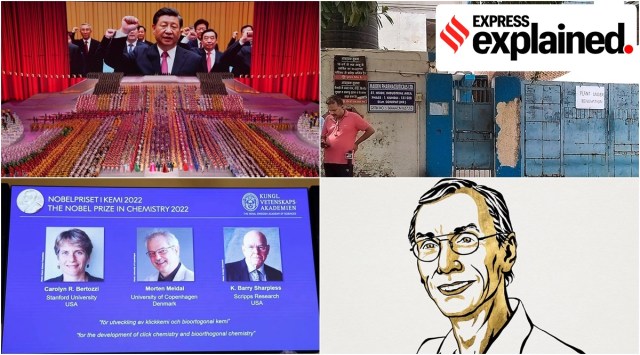Latest Comment
Post Comment
Read Comments
 (Clockwise) Chinese President Xi Jinping leading top officials pledging their vows to the party on screen during a gala show ahead of the 100th anniversary of the founding of the Chinese Communist Party in Beijing; Maiden Pharmaceuticals Limited factory in Sonepat district, Haryana; The winners of the 2022 Nobel Prize in Chemistry are Carolyn R. Bertozzi (US), Morten Meldal (Denmark) and K Barry Sharpless (US); Svante Paabo, winner of the 2022 Nobel Prize in Physiology or Medicine.
(Clockwise) Chinese President Xi Jinping leading top officials pledging their vows to the party on screen during a gala show ahead of the 100th anniversary of the founding of the Chinese Communist Party in Beijing; Maiden Pharmaceuticals Limited factory in Sonepat district, Haryana; The winners of the 2022 Nobel Prize in Chemistry are Carolyn R. Bertozzi (US), Morten Meldal (Denmark) and K Barry Sharpless (US); Svante Paabo, winner of the 2022 Nobel Prize in Physiology or Medicine.Dear Express Explained reader,
We have just completed a week of Nobel announcements, and the last honour, The Sveriges Riksbank Prize in Economic Sciences in Memory of Alfred Nobel — the so-called economics prize — will be announced tomorrow. Like every year, Amitabh Sinha wrote about the prizes, their winners, and the relevance of their achievements for the rest of us.
Do read Amitabh’s explainers on Svante Paabo, winner of the 2022 Nobel Prize in Physiology or Medicine, who is credited with developing methodologies to extract ‘clean’ DNA from human fossils thousands of years old and reading the genetic information they contain; Alain Aspect, John Clauser, and Anton Zeilinger who were jointly awarded the Physics Nobel for their work on quantum entanglement; and Carolyn Bertozzi, Barry Sharpless, and Morten Meldal who have got the Chemistry Nobel for their researches on ‘click’ chemistry.
A week from today, on October 16, the Chinese Community Party begins its 20th National Congress, a session that is widely expected to extend for at least another five years Xi Jinping’s paramount leadership over the country. The weeklong meeting has three main tasks: to endorse leadership transitions; to approve changes to the party constitution; and to deliberate on policy issues.
Given the enormous importance of China, the country that many believe is destined to overtake the United States as the world’s greatest power in the decades to come, what happens in the 20th Congress is of great interest to countries around the globe, including India. Over the coming week, we will publish explainers on various aspects of strategy, diplomacy, and politics around the session — the first of this series was written by Nirupama Subramanian on Friday, pointing to what you need to watch out for the Communist Party brass prepare to meet in Beijing.
The World Health Organisation, along with authorities in India and The Gambia, are investigating the deaths of 66 children in the small West African country, apparently after consuming four different cough syrups that were manufactured on order by a company based in Sonepat, Haryana. Anonna Dutt wrote what we know so far about this intriguing case, the way drug regulatory mechanisms function, and how the syrups could have been turned toxic by contaminant ingredients.
Keep reading The Indian Express Explained. Some of our best content is now behind a paywall, so if you haven’t subscribed to The Indian Express yet, it may be a good idea to do so soon.
Sincerely,
Monojit